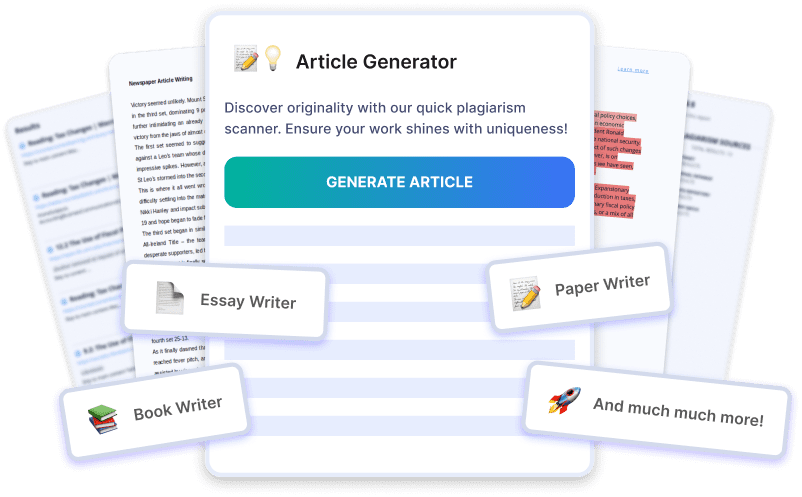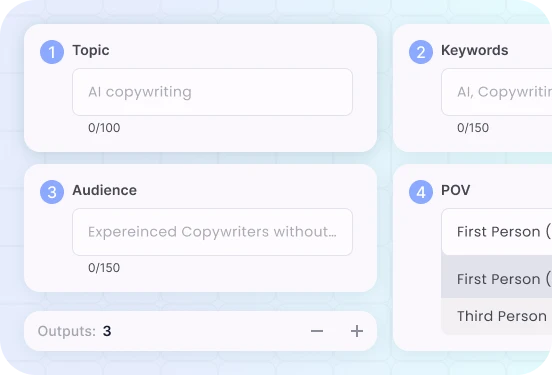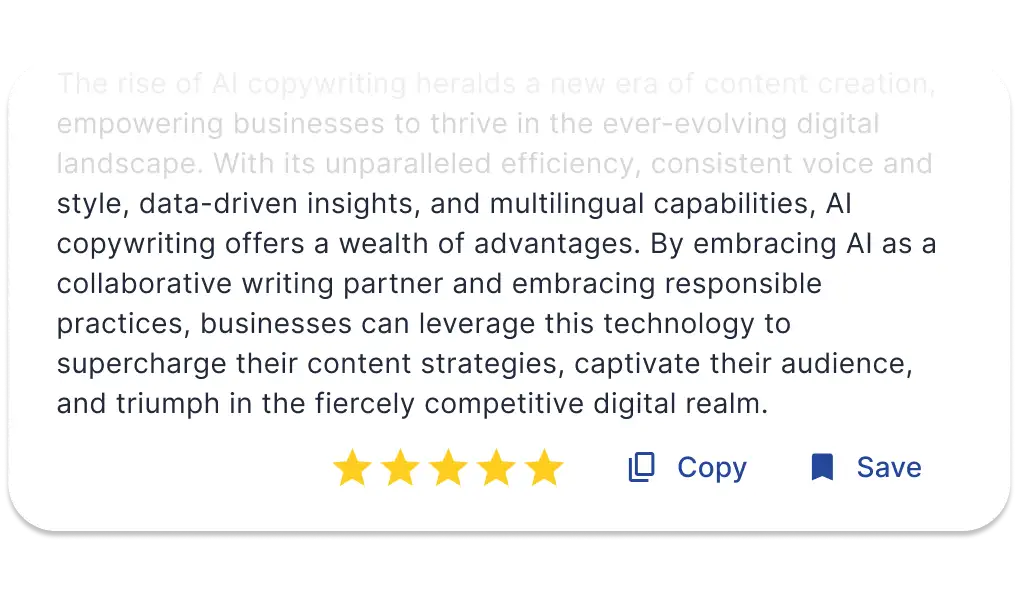Unlock AI Insights for Case Studies
Utilize advanced AI technology to analyze and derive valuable insights from your case studies efficiently and accurately.
Try Justdone
AI Benefits for Case Studies
Efficient Data Analysis
Utilize AI to analyze case study data faster and more accurately, saving time and resources.
Actionable Insights
Leverage AI to gain valuable and actionable insights from case studies for informed decision-making.
Enhanced Decision Making
Improve decision-making processes by utilizing AI technology to derive insights from case studies.
AI for Case Studies Benefits
Efficient Data Analysis
AI for case studies streamlines the process of data analysis, enabling rapid extraction of valuable insights. By automating the analysis of large datasets, AI expedites the identification of trends, patterns, and correlations. This efficiency empowers businesses to make data-driven decisions swiftly and accurately.
With AI, businesses can promptly process vast amounts of data to identify key metrics, anomalies, and opportunities. This capability facilitates comprehensive and in-depth analysis, leading to more informed strategies and improved business outcomes.
Try Justdone ->
Enhanced Predictive Capabilities
AI for case studies empowers predictive modeling by leveraging machine learning algorithms to forecast future trends and outcomes. By analyzing historical data, AI can identify patterns, enabling accurate predictions for various scenarios. This predictive capability equips businesses to anticipate market trends, customer behavior, and potential risks.
The use of AI enhances the accuracy of predictive modeling, enabling businesses to make proactive decisions and develop strategies that align with future market dynamics. This proactive approach provides a competitive edge and supports sustainable growth.
Try Justdone ->
Optimized Resource Allocation
AI for case studies facilitates optimized resource allocation by providing insights into resource utilization, demand forecasting, and operational efficiency. Through AI-driven analysis, businesses can identify areas for resource optimization, cost reduction, and improved operational performance. This optimization leads to enhanced resource utilization and cost savings.
By leveraging AI, businesses can allocate resources more effectively, aligning with demand fluctuations and operational requirements. This optimized resource allocation enhances agility and responsiveness, enabling businesses to adapt to dynamic market conditions and evolving customer needs.
Try Justdone ->
Effective AI Integration Tips
Data Quality Enhancement
Ensure that the data used for AI analysis is of high quality, clean, and structured. Poor data quality can significantly impact the accuracy and reliability of AI-driven insights. Implement data cleansing and validation processes to enhance the quality of input data for AI analysis.
Leverage data quality tools and practices to maintain the integrity and relevance of the data used for AI analysis. High-quality data is essential for achieving accurate and actionable insights through AI-driven case studies.
Continuous Model Refinement
Regularly refine and update AI models to ensure their alignment with evolving business dynamics and market conditions. Continuous model refinement enhances the accuracy and relevance of AI-generated insights, enabling businesses to adapt to changing scenarios effectively.
By incorporating feedback loops and performance monitoring, businesses can iteratively refine AI models to capture new patterns, trends, and variables. This continuous refinement ensures that AI-driven case studies reflect the most current and relevant analytics.
Interdisciplinary Collaboration
Foster collaboration between data scientists, domain experts, and business stakeholders to maximize the value of AI-driven case studies. Interdisciplinary collaboration facilitates the integration of domain-specific knowledge, business context, and technical expertise into AI analysis.
By promoting cross-functional collaboration, businesses can ensure that AI-driven insights are aligned with business objectives, industry nuances, and practical applicability. This collaborative approach enhances the relevance and actionable nature of AI-generated case study findings.
Ethical and Responsible AI Usage
Prioritize ethical considerations and responsible AI usage to uphold data privacy, fairness, and transparency in AI-driven case studies. Adhere to ethical AI principles and guidelines to ensure that AI applications align with ethical standards and regulatory requirements.
By integrating ethical considerations into AI governance frameworks, businesses can build trust, mitigate risks, and demonstrate a commitment to responsible AI usage. Ethical and responsible AI practices contribute to the credibility and integrity of AI-driven case study outcomes.
User-Focused Interpretation
Emphasize user-focused interpretation of AI-generated insights to ensure relevance and actionable outcomes. Tailor the presentation of AI findings to align with the specific needs, preferences, and decision-making processes of end-users and stakeholders.
By adopting a user-centered approach to interpreting AI-driven case study results, businesses can enhance the practical utility and impact of AI-generated insights. User-focused interpretation promotes effective decision-making and actionability based on AI analysis.
How to use Article Generator
- 1
Choose a template
Select the necessary template from the template gallery.

- 2
Provide more details
Fill out the carefully selected inputs to create the best quality of output content.

- 3
Enjoy the results
Copy, save for later, rate the output or hit regenerate button.

AI Case Study Example
Explore a concrete application of AI for case studies through the following scenario.
Craft a marketing campaign strategy based on AI insights for a new product launch in a competitive market.
Utilizing AI for the marketing analysis of a new product launch involves leveraging advanced algorithms to analyze market trends, consumer behavior, and competitor strategies. The AI-driven analysis provides actionable insights into target audience preferences, market saturation, and potential campaign effectiveness.
Through AI, marketers can identify optimal marketing channels, messaging strategies, and pricing models based on predictive modeling and data-driven recommendations. The analysis also facilitates the identification of niche market segments, enabling tailored campaign approaches for maximum impact.
Furthermore, AI enables the assessment of competitor activities, market dynamics, and consumer sentiment, empowering marketers to craft a competitive and differentiated campaign strategy. By harnessing AI insights, marketers can optimize resource allocation, mitigate risks, and enhance the overall effectiveness of the marketing campaign.
The use of AI for marketing analysis enhances the strategic decision-making process, enabling data-driven campaign planning and execution. Marketers can leverage AI-generated insights to refine campaign strategies, adapt to market fluctuations, and capitalize on emerging opportunities, ensuring a competitive edge in a dynamic and competitive market landscape.
In summary, AI-driven marketing analysis for a new product launch equips marketers with comprehensive and actionable insights, enabling the development of strategic and impactful campaign strategies. By integrating AI into the marketing planning process, businesses can optimize their approach, drive engagement, and achieve successful product launches in competitive markets.
Use AI to analyze financial data and provide a forecast for investment opportunities in a volatile market environment.
Leveraging AI for financial forecasting in a volatile market environment involves harnessing advanced algorithms to analyze historical market data, economic indicators, and investment patterns. The AI-driven analysis facilitates the identification of potential investment opportunities, risk assessment, and performance projections based on predictive modeling and trend analysis.
Through AI, financial analysts can gain valuable insights into market volatility, asset performance, and emerging trends, enabling informed investment decision-making. The analysis also supports scenario planning, stress testing, and risk management strategies to navigate the complexities of volatile market conditions.
Furthermore, AI empowers financial professionals to identify correlations, anomalies, and investment patterns that may not be apparent through traditional analysis methods. By leveraging AI-generated insights, analysts can optimize portfolio allocation, hedge against risks, and capitalize on market opportunities with confidence and agility.
The use of AI for financial forecasting enhances the accuracy and agility of investment decision-making, enabling proactive and informed strategies in volatile market environments. Financial professionals can leverage AI-driven insights to navigate uncertainty, capitalize on market fluctuations, and optimize investment portfolios for sustainable growth and resilience.
In conclusion, AI-driven financial forecasting provides valuable insights and predictive capabilities, empowering financial professionals to make informed investment decisions and strategic portfolio adjustments in volatile market environments. By integrating AI into financial analysis, businesses can adapt to market dynamics, mitigate risks, and capitalize on investment opportunities for long-term success.